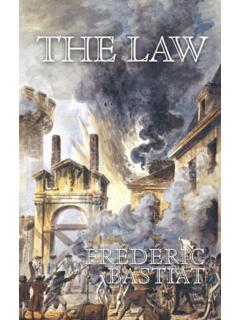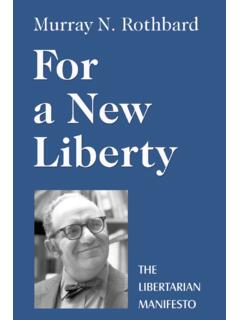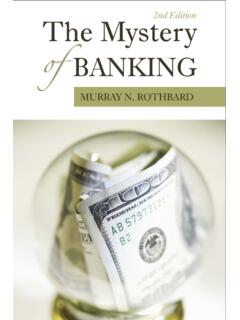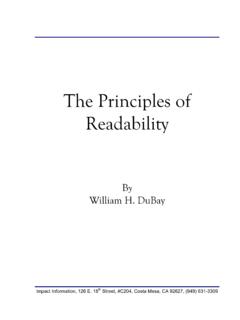Transcription of Essentials of Economics - Mises Institute
1 Essentials of Economicsa brief survey of principles and policiesbyfaustino ballv Translated from the Spanish and Edited byARTHUR GODDARDd. van nostrand company, , new jerseytorontolondonnew yorkD. VAN NOSTRAND COMPANY, Alexander St., Princeton, New Jersey (Principal office)24 West 40 Street, New York 18, New YorkD. Van Nostrand Company(Canada), , Kensington High Street, London, , EnglandD. Van Nostrand Company Hollinger Road, Toronto 16, CanadaCopyright,c 1963 byWILLIAM VOLKER FUNDP ublished simultaneously in Canada byD. Van Nostrand Company(Canada), reproduction in any form of this book, in whole or in part(except for brief quotation in critical articles or reviews), may bemade without written authorization from the edition, Mexico, 1956 10,000 copies2nd edition, Mexico, 1961 5,000 copies3rd edition, Mexico, 1961 5,000 copiesFrench translation, Paris, S lif, 1957 Spanish editions in Buenos Aires and Guatemalaand in preparation in ColombiaTranslations in preparation in Germany, Brazil,and Japanprinted in the united states of americaForewordFaustino Ballv was one of those rare scholars who instinctivelyavoid the pitfalls of specialization; who have the gift of integratingthe divisions of learning simply, yet without was the talent that gave the leaders of the Renaissance theirstature.
2 Of Professor Ballv it could be said, as in the characteri-zation that gives a contemporary play about Sir Thomas More itstitle, that he was indeed a Man for All Seasons. Like Erasmus before him, Professor Ballv spoke not for anynarrow, nationalistic culture, but for the spirit of Western Civiliza-tion as a whole. Born in Barcelona, in 1887, he trained first as alawyer, took his doctorate in Madrid, and then proceeded for fur-ther study first to Berlin and then to London. It was in Englandthat, with a seasoned juristic background, he first specialized inthe study of practitioners of that science, whether of the left or theright, have done all too much to justify the adjective dismal that was applied to it in Ballv s youth. The more credit to himfor bringing to the subject not only the clarity and precision of afirst-class legal mind, but also the spiritual warmth of a still in his teens the young Ballv had edited a republi-can paper, and in the stormy thirties, as the clouds of civil warclosed over Spain, he was elected a deputy of that party.
3 Butthere was no place for this true liberal when the struggle degen-erated into a power contest between Fascism and his native land forever, Ballv went first to France andvviForewordthen to Mexico, where he acquired citizenship in 1943 and liveduntil his death in Mexico City, in addition to the active practice of law, Dr. Bal-lv soon took over two professorial chairs of law and of eco-nomics. In both fields his interest was always in the underlying val-ues. He never viewed either law or Economics as self-supportingsubjects, or suggested that they could be made so by pseudosci-entific techniques. He was no positivist, but, in both fields, anexponent of classical liberalism at its is the depth of the author s personal philosophy, plus the un-usually luminous quality of his thought, that makes hisEssentialsof Economics , for all its brevity, an outstanding book.
4 Originallywritten in Spanish, asDiez lecciones de econom a, then publishedin French asL conomie vivante, it appears now for the first timein an English edition. The general reader, who may have beenalienated by pretentious texts on Economics , will soon see forhimself how quickly, cleanly, and clearly Professor Ballv reachesthe heart of his , something of the warmth and cheerfulness of theauthor s personality comes through, to make the reader feel thathe is listening to the conversation of an old and cherished his lifetime, unfortunately, Dr. Ballv was not as well known inthis country as in Europe and Latin America. That has been ourloss, now compensated by this translation of a study encouragingto all who fear that western man no longer has the individualstature to meet the challenge of our MorleyPreface to theEnglish-Language EditionIn his preface, included here in translation, to the original Mex-ican edition of this book, Sr.
5 Lic. Gustavo R. Velasco, himself adistinguished scholar in both law and Economics , as well as anaccomplished linguist, points out that elementary introductionsto economic science comparable in clarity, authoritativeness, andsimplicity to Sr. Ballv s work are exceedingly rare, not only inSpanish, but also in other languages. And, indeed, within a yearof its publication, a French translation by M. Raoul Audoin madeits appearance to fill the need of readers of that language inContinental Europe, where the book soon received the acclaimit the same need exists in English and has existed forsome time. There are, to be sure, a number of excellent trea-tises on Economics , some of them rather voluminous, whichexpound the subject with an exhaustiveness that should satisfythe most demanding student. But when one looks for simplerand briefer presentations, designed, not for specialists, but forthe average educated person who seeks enlightenment in regardto the economic questions underlying the great issues of our day,there is little to be found that is altogether satisfactory.
6 No doubtthose who have taken the pains to acquire a thorough knowledgeof Economics may say that there really is no substitute for theconsummate understanding that only the study of the works ofthe masters in this field can provide; anything else is necessar-ily superficial at best and is likely to be open to sophisticatedviiviiiPreface to the English-Language Editioncriticism. This much may be granted. But the gap between theerudition of the scholars a relatively small group, whose pri-mary influence is in the classroom and the lecture hall and theignorance, not to say prejudices, of even otherwise well-educatedmen and women who have not specialized in economic science,has not been left a vacuum. There is no dearth of pamphlets andpopular books in which inveterate errors and fallacies long sincerefuted continue to be given currency. As for the textbooks usedin the secondary schools and the colleges, besides being oftendull and pedantic, they fail, in many instances, to reflect thepresent state of economic science, deal with much that is strictlyirrelevant to it, and are, in any case, unsuited to the requirementsof the citizen who wishes to inform himself accurately concerningthe Essentials of that subject so that he may have a well-founded,rationally defensible opinion concerning the consequences to beexpected from the various proposed policies open to his choicein his capacity as a voter in a was chiefly for this type of reader that the ten lessons ineconomics here presented were intended.
7 The peculiar merit ofthis book is its combination of brevity, readability , and the reader will find, within the compass of a few short chap-ters, a synoptic survey of the essential principles of economicsand an application of them in the critique of popular doctrinesand policies, the whole illustrated with apt historical referencesand supported by solid learning. This unusual blend of ped-agogic skill and sound scholarship gives the work its uniquecharacter and makes it ideally suited to fill a need that has, upto now, been left, for the most part, unsatisfied. Its translationinto English will have been justified if it helps to clear up someof the grave misunderstanding and confusion that infect muchof the popular discussion of economic questions and to correctthe faulty opinions that currently constitute the main obstacle tothe diffusion of prosperity and English version is based, for the most part, on the originalSpanish-language edition, but it takes account also of some ofthe substantive changes that, as we learn from M.
8 Pierre Lhoste-Lachaume s preface to the French translation, were introducedPreface to the English-Language Editionixinto the text of the latter at his suggestion. To be sure, not all theadditions, deletions, emendations, and rearrangements madein the French version have been incorporated into the Englishtext, for in some cases they appear to have been made as theeditor frankly admitted chiefly in the interest of adapting thebook to the concerns of the French public or of bringing certainpoints into sharper relief in the light of contemporary Europeanconditions. However, in view of Sr. Ballv s express statement, inthe foreword he wrote for the French translation, of his approvalof the revised text, the latter has been followed here wherever itseemed to represent an improvement, in vigor and consistencyof expression, over the Spanish the same time, an effort has been made to assist the readerby the citation, wherever possible, of the original text and titleof books quoted or referred to by the author in their Spanishtranslations.
9 In this connection, indebtedness is gratefully ac-knowledged to the courtesy of George Allen & Unwin, Ltd., forpermission to quote from William Arthur Lewis The principles ofEconomic Planning, GoddardPreface to theSpanish-Language EditionHere is a book that answers an essential need. Simple, clear, andintelligible, it is a book that had to be written, and, now that ithas been written, it deserves to be and will be especially, when many works on Economics read liketreatises on hydraulics, and when not a few economists seem totake an actual pride in the obscurity of their language, it hasreally become necessary that someone return to the traditionalconception of it as something more than a technique for spe-cialists, as a subject concerned with an aspect of experience thatought to be treated as an integral part of our lives and hence asone in need of being understood again, if not by everyone, thenat least by the educated and by the intellectual leaders of the importance, nay more, of the urgency of this task,there can be no doubt.
10 It has already become platitudinousto observe that the great questions of our time are economicin character or at least are connected with or founded uponeconomics. Whereas in the sixteenth and seventeenth centuriesit was religious controversies, and in the nineteenth centurypolitical reforms, that occupied the center of the scene, today itis the economic problems that appear as vital and decisive; andeven the churches devote a good part of their time and effort tosocial and economic preachments, sometimes, one fancies, tothe extent of neglecting their spiritual mission and affairs of amore exalted nature. To be sure, the question that I regard asthe central issue of our age, viz., the choice that confronts ourxixiiPreface to the Spanish-Language Editiongeneration between a free or voluntary society and a servile ortotalitarian society, does transcend the purely economic planeand involves broader problems, political and social, and evenquestions of mental health and personal morality.

















